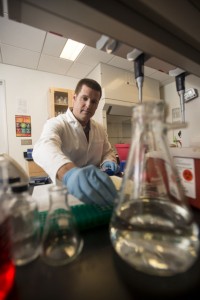CSUN Biology Professor Expands Cancer Research as Visiting Professor at Harvard Medical School

CSUN biology professor Jonathan Kelber makes cancer cell samples to analyze in his lab. Photo by Lee Choo.
This summer Jonathan Kelber, an associate professor of biology at California State University, Northridge, traded the palm trees of Northridge for the ivy of Cambridge, Mass., and the hallowed halls of Harvard University. The CSUN researcher and mentor had a rare (for college professors) opportunity for professional development and to become a mentee himself for 12 weeks, serving as a visiting professor in the Department of Cell Biology and and Ludwig Institute for Cancer Research at Harvard Medical School.
In May, the American Society for Cell Biology Minorities Affairs Committee awarded Kelber a visiting professorship, funded by the National Institutes of Health (NIH). The award sent Kelber to work with Joan Brugge, one of the world’s foremost cancer researchers and director of Harvard’s Ludwig Institute.
The grant program is designed to partner cell biology faculty from minority-serving institutions such as CSUN with established researchers at larger “R1” institutions — schools classified as doctoral universities that engage in extensive research. The visiting professorship aims to establish pathways for collaboration on grants and publications, Kelber said.
The other coup for the CSUN community, he said, is that Brugge will visit CSUN to give a guest lecture sometime this academic year.
“Work from Dr. Brugge and her trainees over the years has undoubtedly transformed cancer research,” said Kelber, who returned from Brugge’s Harvard lab on Aug. 25. “Early in her career, she identified a protein called Src kinase. Kinases are enzymes that catalyze different processes in the body, in cells. This discovery was huge, as Src kinase is a major culprit in many, many cancers. So, discovering that protein laid the foundation for a lot of research from her own group and others.”
Starting in late May, Kelber spent the summer working in Brugge’s lab on new avenues of research that complement the ongoing work in his CSUN research lab in Chaparral Hall, which includes a team of biology undergraduate, graduate and postdoctoral trainees.
“It was very exhilarating — it was nice for me to go back [to Harvard] and be in that environment, where everyone’s thinking at a very, very fast pace about these critical problems in the field of oncology,” he said. “It ends up being very productive.”
Kelber and his summer collaborators aimed to develop a system to study how breast cancer cells interact with non-tumor cells. As they manipulated various cell combinations and treated the cells with different anti-cancer drugs and therapies, Kelber, Brugge and their Harvard colleagues found that all the non-tumor cells surrounding the cancer cells they studied were co-opted and “used as shields,” Kelber said.
“We found that the presence of these non-tumor cells completely prevents the drugs from working,” he said. “Next, we want to determine why — what is changing in these cells, so we can possibly identify new vulnerabilities in these [tumor] cells that could either re-sensitize them to approved therapies, or that could be used as new targets to kill the tumor cells directly.”
Some unexpected benefits of his summer at Harvard, Kelber said, were the professional relationships he was able to forge with the staff of “junior scientists” training in Brugge’s lab — scientists doing postdoctoral programs who are on a path to start their own research labs at other institutions.
The summer was especially busy, as Kelber balanced the new research onsite at Harvard with managing and overseeing projects, progress and personnel in his CSUN lab via email and Skype.
In 2015, Kelber and his CSUN team identified a critical “support wall” gene in breast cancer called PEAK1. They published the results of their research in the Public Library of Science (PLoS) One and Biochemical and Biophysical Research Communications (BBRC) journals. These reports were the first ever to show that the PEAK1 gene is essential to tumor cell stability at the earliest stages of aggressive breast cancer metastasis.
Metastasis is the process of cancer cells moving from their original source — in this case the breast — to other parts of the body through the bloodstream and forming malignant tumors elsewhere. (In January 2017, the NIH awarded Kelber and his team $1.46 million over the next four years to support their ongoing studies of PEAK1 in this context.)
When Kelber established his lab at CSUN in 2012, his team also took on some serious challenges related to pancreatic cancer, including how it forms, therapy resistance and metastatic progression.
“One of the things about pancreatic cancer that makes it so deadly is that it’s rarely detected early,” Kelber said of those research efforts. “It’s one of very few cancers that have a five-year survival rate that’s less than 10 percent (at less than 7 percent for pancreatic cancer). This means that within five years of being diagnosed, nearly 95 percent of patients will die. Unlike breast cancer, which is commonly diagnosed early — and if so, the survival rate is nearly 100 percent — pancreatic cancer is both difficult to detect early and to treat or cure even when detected early.”
On Aug. 30, the peer-reviewed journal Scientific Reports (by Nature Publishing) published the group’s pancreatic cancer study demonstrating that a new gene, ITGA1, may be used to detect the earliest stages of pancreatic cancer and as a target to prevent the progression of this deadly disease. This most recent report was the culmination of five years’ work by Kelber’s lab trainees, including primary authors Armen Gharibi (now working at Thermo Fisher Scientific in LA) and Sa La Kim, a 2017 CSUN Presidential Scholar and past participant in CSUN’s Maximizing Access to Research Careers (MARC) program. This year, Kim is continuing her research on ITGA1, as part of her graduate studies at CSUN under Kelber’s guidance, before applying to M.D./Ph.D. programs.

 experience
experience